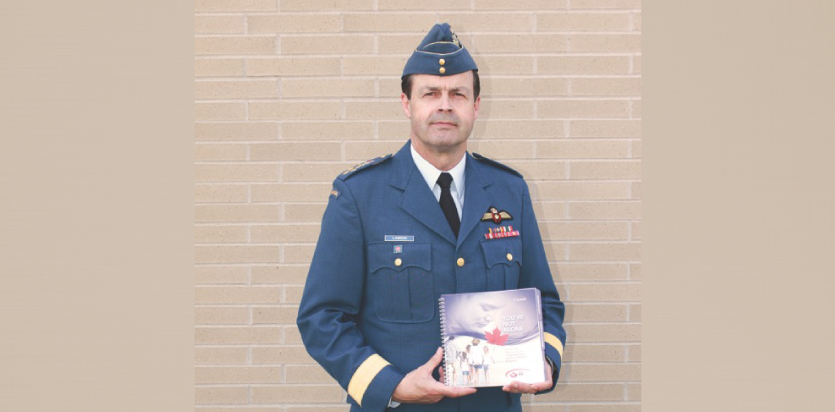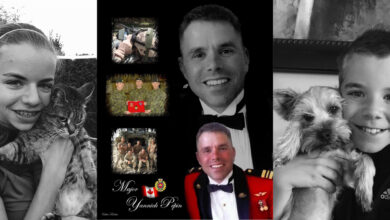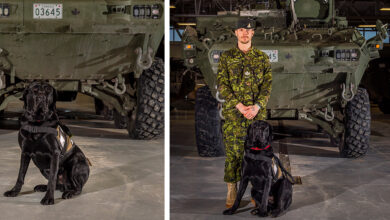Best of CMF Magazine
Mental Health Resources Available
Although mental health issues are not new to military personnel and their families the scope of programs, services and resources is. In an effort to offer support to military members and their families the Canadian Armed Forces (CAF) has recruited honorary colonels, collaborated with mental health organizations and created internal resources for their members and families.
Two of the most talked about mental illnesses that military personnel face include post-traumatic stress disorder (PTSD) and operational stress injury (OSI). But some families may have a loved one struggling with depression, burnout, anxiety or any of the other mental illness that are plaguing over seven million Canadians across Canada.
Due to the operational tempo of the CAF over the last 20 or so years military personnel and their families have been facing battles on the home front with conflicts being waged at work, in dark basements and at dinner tables across the country. The unpredictable and often damaging behaviours are the result of PTSD and OSI. Lulled into a false sense of peace during the honeymoon period following repatriation families can be thrown into turmoil when the latent symptoms of PTSD or OSI begin to infiltrate their daily lives. Life after deployment becomes stressful and discouraging as military personnel and their family members struggle to cope as individuals, and as a family unit. Some military families find it extraordinarily difficult to maintain overall well-being and balance as they struggle to cope with frightening and isolating mental illness.
This past May the Chief of the Defence Staff (CDS), General Tom Lawson and Chief of Military Personnel (CMP) Major-General David Millar attended the Connecting Community of Care at the Royal Ottawa Mental Health Centre where General Lawson launched the book You’re Not Alone and latest episode in The Mind’s the Matter video series.
Calling the video compelling Lawson said, “It really helps us understand the challenges associated with Operational Stress Injuries and really, more important that these challenges can be overcome.”
The Mind’s the Matter is a series of ten web based interactive videos that have been specifically created for teens. The videos were developed with clinical guidance from mental health experts at The Royal Ottawa Operational Stress Injury Clinic. The series focuses on transition, caregiver fatigue, worry, stigma and the potential for destructive behaviour as a result of trying to cope with mental health issues. The videos support the well-being of military spouses, children and other family members who play an important role in the treatment and recovery of their loved military member.
Regarding You’re Not Alone General Lawson noted the guide was designed to connect military personnel and their families to mental health and social wellness programs accessible to them in a way that has not been available before.
Director of Military Family Services Colonel Russ Mann explained the mental health guide was designed so members and their families could easily find the resources they needed. He noted the services were all there before the guide was created.
“The need for a mental health guide stems from the release of the Canadian Forces Ombudsman’s Report in which the recommendation was made that we needed to do a better job of communicating with families,” said Col. Mann. “We know for certain that some Canadian Armed Forces members and their families are struggling with mental health issues and we need to connect them to the resources and support that are set up in our communities to help them cope. Families themselves also told us that finding a listing of resources has not been easy. The production of this guide is one way of improving access to information and resources in a family-friendly way.”
Included in the guide is a reference to Canadian Mental Health Association and programs they offer. Last December the organization spoke up as Canadians across the country and moreover in the CAF community struggled with the onslaught of suicides. In a press release the organization called for an integrated and collaborative strategy on suicide prevention for military personnel and all Canadians.
Having reviewed the Surgeon General Mental Health Strategy for the Canadian Armed Forces Peter Coleridge, national chief executive officer, Canadian Mental Health Association said, “The Strategy strongly supports the value of community mental health services and supports for members of the military.”
However, one of the obstacles for a lot of Canadians, especially for military personnel and their family members struggling with a mental health issue, is the act of reaching out for help, as they fear they will be stigmatized. The fear of being judged and found guilty of being weak holds people back from reaching out for help. For some people seeking help is a sign of weakness, for others there is a fear if they, or anyone in their family, seeks help their military career will be negatively impacted in some way.
The CAF offers a variety of places for families to turn in a time of need, as mental illness cannot be tackled using a cookie cutter approach. Each of the services and programs are relatively unique and can be found listed in the table of contents of You’re Not Alone. Also listed are the relatively new and progressive mobile applications OSI Connect and PTSD Coach Canada. Updated regularly and information rich they make finding answers on the go easier than ever before.
It is important to note that the CAF also has resources in place for families that are struggling with marital and family relationships, interpersonal relations, personal and emotional issues, stress and burn-out, work-related concerns: including harassment and sexual assault and issues with alcohol, drugs and prescription drugs.
For Michelle Turner the services offered helped her find balance and a state of familial mental well-being. Turner was married to a CAF member who coped with PTSD, depression and anxiety. When it came to recognizing and then admitting there was a problem she had to self-evaluate. She suggests people be aware of self-stigma.
“Sometimes we think the world is judging us, and really we are being harder on ourselves than they are,” noted Turner. The most frustrating part of her personal journey was accepting some of the services she was sent to initially were not the exact fit for her and weren’t the ones she actually needed. “You may get juggled around. Remember the onus is on you to find the right service. That’s not a bad thing, because it’s your story. No one else can tell you what you need. It just takes some work.”
Now an Operational Stress Injury Social Support (OSSIS) Family Peer Support Coordinator worker Turner recommends people be as clear as they can when asking for help or they will be bumped around. Because mental health is not one stop shopping there are a lot of services available, but people need to advocate for themselves to find the right fit. Turner advises people should take some time and think about what service they need.
“Maybe write down what you think the problems you face are. List them. It helps you to be clear and that makes it easier for helpers to lead you in the right direction. You are entitled to services, but no one is going to come and knock on your door and offer you help. You still have to reach out. Sometimes you might reach for the wrong help, but be patient and keep trying. No one is facing exactly the same problem you are.”
She suggests people visit their local Military Family Resource Centre, call the Family Information Line, go on-line and do some research so they have a clearer picture of what services they need. However, she advises, “Don’t wait until you are in a crisis.”
Once you have found the right resource that can help you, you need to be prepared to be forthright and tell the truth about your problems. “You have to trust, trust, trust. Try not to worry about repercussions to careers or what the neighbours think, because chances are if you are military the people that you are think are going to judge you are going through the same thing, maybe worse.”
She also suggests in order to receive the appropriate help people need to ensure their story is accurately heard and assessed. “If you seek civilian services know that they do not necessarily understand your military lifestyle. Just because you are referred to a service doesn’t mean they know how we operate. You may have to really educate them or look for another helper. If you sit down with one resource and you don’t feel a connection, like you cannot talk to them, ask to be referred to someone else. Don’t try to force a connection that isn’t there. Don’t waste your time. Move on. They will not take it personally.”
When it comes to living with someone who is struggling with PTSD, an OSI or a mental illness Turner suggests partners be pro-active and seek help even if their partner isn’t ready. “You cannot force them to get help, but it’s a great time to arm yourself with information and be prepared to deal with whatever you can whenever you have to,” said Turner. She notes children can be a huge source of guilt in families coping with PTSD. “You always worry that your behaviour is hurting them. But kids are resilient. Look after yourselves and you will be teaching them how to cope better, and that asking for help is okay too. Don’t be afraid to tell the kids the truth, at an age appropriate level. They already know what’s going on. They live in the same house.”
Her final piece of advice, “Remember to take good care of yourself. When you are dealing with member with PTSD everything can become about them and their problems and it’s not. Everyone in the family is trying to cope. Look after yourself and be good to yourself. Compassion fatigue is real and you need to avoid it.”
Children’s Hospital of Eastern Ontario (CHEO) psychologist Dr. Phil Richie specializes in mood and anxiety disorders, urgent care, disaster response and helping parents build resilient teens. Richie noted that in order to de-stigmatize mental health issues it is important for people to talk about it. “When we don’t talk about it that is what makes us anxious and that is what makes things worse, when we avoid it.”
While it can be exhausting raising children Richie notes it is normal for parents to feel burnt out and tired at some time but when the condition turns chronic it’s a sign that a person may need help.
“When you are feeling really burnt out everyday and every night, you are constantly exhausted, you aren’t able to concentrate, your own mood is affected, you are not able to model healthy emotional regulation for your kids, you are flying off the handle that is a real indication that we need to bring in the troops in a sense and get some help,” explained Richie.
He notes he has never met a parent who at some point in their parenting life has not been exhausted, that is normal. However, “it’s not normal to be exhausted everyday or to be sad and depressed everyday, not being able to sleep because of anxiety everyday. When it is interfering with your day-to-day functioning that is the time that you are going to want to get some help.”
June 2014 the CAF is adding to their mental health toolbox by launching another video in their series on the challenges CAF members face and the support available to them through the CAF mental health system. The first video, with an introduction by television personality Rick Mercer, addresses the stigma of mental health issues. In it, Mercer joins the ranks encouraging military members and their families to seek help if they need it. The latest video concerns the process of treatment, and answers questions members might have about the services available to them once they do put their hands up, leaving the ultimate decision to receive help up to CAF personnel and their families.
Resources
Family Information Line (FIL) 1-800-866-4546 or 1-613-995-5234 where counsellors are taking calls from military family members 24/7.
You’re Not Alone and The Mind’s the Matter video series may be accessed at your local MFRC, www.familyforce.ca or www.forces.gc.ca.
The CAF personnel videos www.forces.gc.ca.
Members Assistance Program 1-800-268-7708
OSISS www.osiss.ca
***This article was originally published in our Summer 2014 issue***
Get More! Receive six issues of Canadian Military Family Magazine in your mail box for only $17.95! Click here to subscribe NOW!










